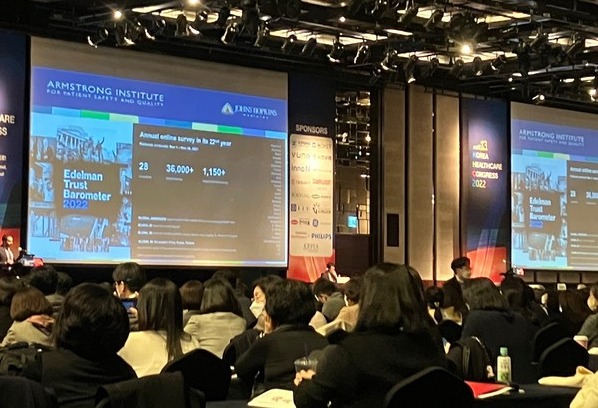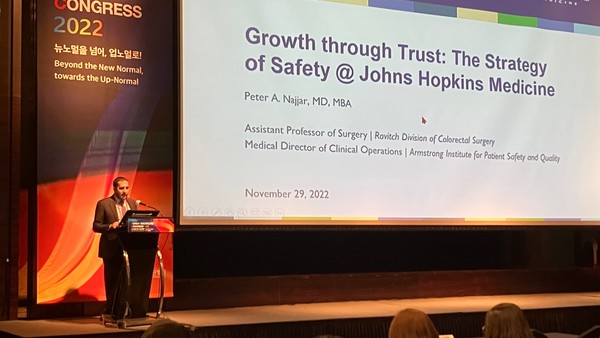
What measures prevent the departure of exhausted medical personnel due to the prolonged Covid-19 pandemic? Is there a way to make patients who left the hospital due to Covid-19 visit the hospital again?
In answer to these questions, “trust” was cited as a virtue that hospitals in the post-Covid-19 era should have.
At a workshop organized by the Korea Hospital Association with the theme, “Beyond the New Normal, Towards the up-Normal,” on Tuesday, foreign experts put forth various opinions for hospitals to restore the public trust that had collapsed due to Covid-19.
To prevent the outflow of the medical workforce in Korea and the world aggravated by Covid-19, the global medical community should show leadership that can give credibility to the general public, according to the experts.
Risto Miettunen, former chairman of the International Hospital Federation, delivered a lecture titled “Keynote of global healthcare in the post-Covid era and Korea’s role,” pointing out that the medical workforce stage is a global problem. “The IHF also has had lots of discussion about the outflow of medical personnel,” he said.
Noting that statistics showed 17 million medical personnel were lacking as early as 2013, Miettunen said the situation now has moved beyond shortage to a crisis.
“Even in the U.S. that has overcome the worst Covid-19 situation, the medical community is experiencing the same difficulty,” he said.
Miettunen noted that there seems to be no easy solution (for the medical workforce shortage).
“Strong leadership is needed. Leaders should lead workers to return to hospitals with trust and confidence,” he said. “They must persuade medical personnel from the bottom of their heart, delivering a message that the medical workers are doing sufficiently worthwhile jobs.”
Miettunen said, “Good leadership should be shown in the field. Leaders should not be armchair coaches. If things get better, more workers will return. This is not just a matter of money. What’s important is a trustworthy picture of the future.”
Johns Hopkins Medicine has made a ‘High Reliability Organization’ to restore trust

To restore the social trust that collapsed due to Covid-19, Johns Hopkins Medicine selected “safety enhancement” as its strategy. It has built a “high reliability organization” within the hospital and established a system to make it a “safe hospital.”
Peter Najjar, medical director of Johns Hopkins Medicine’s Armstrong Institute for Patient Safety & Quality, said, “We conducted an opinion poll on 36,000 people in 28 institutions after the pandemic's outbreak and found distrust has sharply increased. Faced with the result, we introduced high reliability organization to heighten trust and organizational transparency.”
Najjar stressed that culture is important to restore trust within an organization.
“You should make employees think reporting mandatory and create a fair environment to prevent negative results when problems occur,” he said. “You should reduce human errors and systemic risks without imposing penalties.”
Johns Hopkins Medicine has introduced the “HERO (Hopkins Event Reporting Online)” system, which allows staff members to make prior reports to prevent safety events and errors and guarantee trust. According to Najjar, it also worked out a tool to analyze such reports automatically.
“One of the HERO system’s characteristics is to ensure that there is no disadvantage if you report something in advance,” he said. “It is a non-punitive reporting system and one that can make reporters heroes. For example, we received 45,000 negative reports but judged humans could not handle them, so we made the system.”
Besides, the best hospital in the U.S., or perhaps in the world, introduced the Good Catcher system, which selects staff members who make danger reports and provides incentives. Johns Hopkins Medicine also implemented CRP (communication & resolution program), which helped to solve communication problems between patients and employees.
“I think overresponse is better. I believe you should investigate what’s believed to be important quickly, discuss before accidents occur, and build up such a culture,” Najaar said. “The strategy we selected to maintain the Johns Hopkins was ‘safety.’ It has become even more important after the outbreak of the Covid-19 pandemic.”

